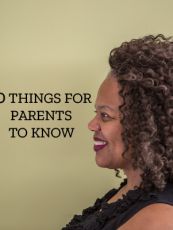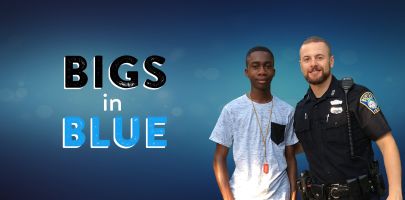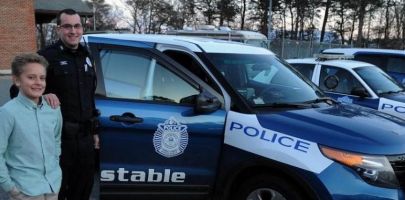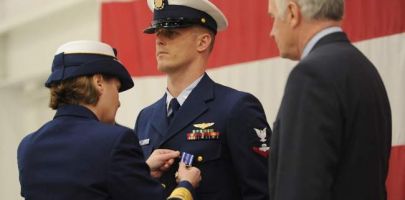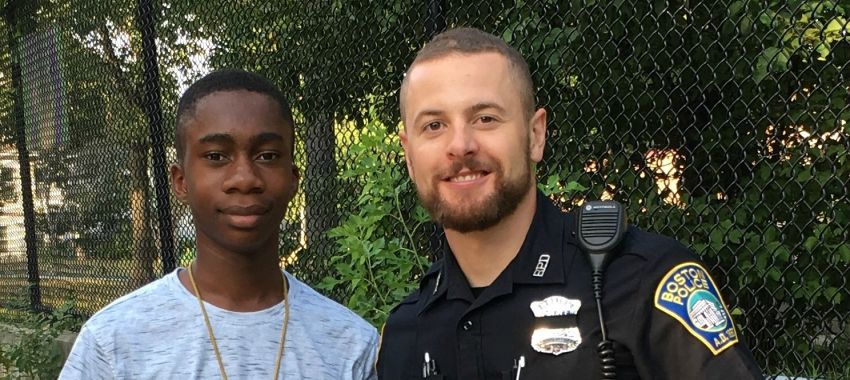
Mentoring Real Life Stories: Bigs in Blue Officer Seth Makes a Difference
Big Brother Seth Parker first got involved with Big Brothers Big Sisters of Massachusetts Bay a little over a year ago. As a police officer, Seth often does patrols in the Roxbury and Dorchester areas, interacting with youth in the community while on duty. After talking to some of his friends who were Bigs, he decided to take his involvement a step further and become a Big Brother himself. Read on to hear about Seth’s experiences with the program and how his role as a police officer impacts his mentorship.
What made you want to become a Big?
Working in the neighborhoods that I work in, you see a lot of kids who don’t really have a lot of positive influences in their lives. More specifically, see a lot of kids with no positive male role models in their house. It’s hard going to work and not doing anything about it and I had two really good friends who had been Bigs, so I figured that it would be a great way to do my part and be a bigger influence on somebody outside of my job.

Do you think being in law enforcement has impacted your mentoring style or your relationship with your Little Brother, Daniel?
I work in the same neighborhood Daniel lives in, so I kind of understand the dynamics of his community. There is a bit of a gang culture, so it’s not really safe for kids to play outside by themselves without adult supervision or they may be approached by people associated with gangs. I could definitely understand how scary that is. His mother isn’t able to go outside to play basketball with him, so he’s kind of locked down in the house. Day-to-day, I see a lot of kids in similar situations, who don’t have a father figure or don’t really have a positive male influence in their household. All they need is somebody to show them the responsibilities that come along with becoming a man, how to be respectful, how to work hard and develop a strong work ethic. Also, how to take responsibility for your own life and not run with the wrong crowd, ultimately getting into the criminal atmosphere that is so prevalent in some neighborhoods. He’s so lucky to have an awesome mom who really cares. She signs him up for programs and she calls to give me his grades and let me know what he’s been up to, if he’s not going to himself. He’s fortunate to have such a great mother.
Do you think him knowing you’re an officer, especially in his neighborhood, has an impact on his relationship with you?
He actually wrote a letter at one of the Big outings. Somebody was interviewing him, and he said that he feels safe knowing I’m a police officer, and I do work in his neighborhood. It was cool to see that it made him more comfortable, or at least he said he was more comfortable with me being a police officer and having an understanding of his neighborhood.
Do you have anything you would like to instill in Daniel or a way you would like to impact his life?
Daniel has opened up to me about wanting somebody to show him different things that he wouldn’t normally do with his mother. I think he’s really worked on becoming a more self-reliant and self-sufficient young man who is not going to blame other people for his shortcomings. He’s learning that he needs to work hard to be what he wants to be, whether it’s making his basketball team or getting good grades, so he can get into a good high school in the city of Boston. He’s going to hold himself accountable to all the things he wants to be and become. When I first met him, I asked him what he wants to be when he grows up and he said he’d like to be a professional basketball player. I didn’t say he couldn’t be a basketball player, but I let him know how hard it would be to make a career playing basketball and we talked about how important school is and going to college. Explaining that if he wants to be a professional basketball player then he has to put in hours and hours of practice each and every day. The next time we met up, he was like “You know what, I looked into something else. I kind of want to be an engineer”. That’s something he could achieve with the right work ethic. I told him that there are things we can look for to help him become an engineer, like being really good at math and taking courses that are tailored to help him along that path. That really made me feel great that he’s looking for someone to encourage him.
Would you encourage other police officers to get involved?
Definitely. I know a lot of officers—myself included—that will approach kids to shoot hoops or throw a football around. Just stopping to chat with them. I don’t know anybody in my district that doesn’t engage with youth when they see them. That’s probably my favorite part of the job; walking around and talking to people in the community. That’s a big thing within our department. Letting kids know that we’re here to help them. I had a lot of guys talk to me about it and I have two other friends on the job who are also Bigs, so they talk about how much they love it too.
Do you have any advice or final comments?
For Bigs in law enforcement, it’s not going to be much of a shock. They deal with kids who are disadvantaged or kids who don’t have mentors on a daily basis. This would just be an extension of what they do day in and day out on the job. You’re just hanging out with them off duty on your own time. You get to have more one-on-one time to sit down and have dinners and play sports or go to the movies and really build relationships within the community. I’ve become great friends with Daniel and his mother. Now I have stronger ties to the neighborhood I work in, so I definitely encourage anyone on my job to reach out and become a Big.
Check out another awesome Big in Blue: Not All Heroes Wear Capes
Children s safety is our number one priority; throughout the duration of the match, not just the beginning!
